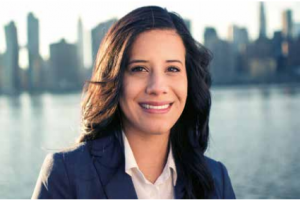A Champion for All People
As a staff attorney with the Immigration Advocacy Project at Queens Legal Services,
Ana Lucia Urizar helps immigrants with applications for asylum, visas and citizenship.
“These are people who can’t afford to hire an immigration attorney and we help them for free,” she says.

The majority of her clients are Spanish-speaking people from
Latin American countries. For Urizar, the work is deeply personal.
She and her twin sister, Ana Gabriela ’13, immigrated to the U.S.
from Guatemala at age 15, and aside from her time at Syracuse
University, she has always lived in Queens. “I’m working in my
home community, which is awesome because Queens has the
highest percentage of immigrants of the five boroughs,” she says.
Urizar attended the Syracuse University College of Law
with the goal of becoming an immigration attorney and spent
her first two years as a lawyer working at the Manhattan nonprofit
Sanctuary for Families. She joined Queens Legal Services in
December 2018. Despite doing similar work throughout her
career, Urizar says she’s seen increasing demand. “Since I
graduated and started working, more and more immigrants are
looking for protection,” she says. “People are terrified. The stakes
are higher now. They are worried about being deported, potentially
being sent back to a country where they were tortured.”
Fortunately, Urizar has yet to have a client deported, but she
says that’s largely due to the time lag in the immigration system.
“Most of my current trials are not scheduled until 2022, and if
we lose, we still have the right to appeal,” she says. “But for clients,
that’s awful too, spending many years waiting to know whether
or not their petition is granted or they’re going to be deported.”
While working in public interest law is personally satisfying,
it’s not without sacrifice, as Urizar graduated from law school
with more than $100,000 in student loan debt.
She’s grateful it wasn’t worse, having received support for both
her undergraduate at law school education at Syracuse University
from the Our Time Has Come (OTHC) Scholarship Fund.
“As a first-generation student of color, I didn’t come from
generational wealth,” she says. “I had the burden of financing
my education, taking on debt to pursue my dreams.”
Financial assistance from OTHC alleviated some of that burden.
“The OTHC Scholarship is absolutely necessary to guarantee the
success of many first- generation students of color,” she says.
“Without the financial help, we would be years behind in achieving
financial stability.”
In addition, OTHC helped give Urizar a sense of belonging on
the University’s predominantly white campus. “There weren’t a lot
of people who looked like me and sounded like me. I definitely had
imposter syndrome,” she says. “Having a sense of community and
belonging through OTHC made a huge difference. And being able
to see ourselves in the successful alumni speakers helped create
and build confidence.”
Outside of work, Urizar says she is a “big nerd who likes to read
and learn.” She participates in three book clubs, including one with
fellow immigration attorneys, where they read books authored by
women of different nationalities and meet over food from the
corresponding cuisine. Most recently, she’s joined a Zoom book
club organized by her college friend Sha Goode ’13 that focuses
on books and discussions about race. The most recent book read
was The New Jim Crow.
“We’re a very diverse group. Sometimes it’s uncomfortable to
have these conversations with friends who are not people of
color,” she says. “Because I wasn’t raised here, it has provided
historical perspective and been incredibly eye opening.”
Whether through her work or outside interests, Urizar never
tires of the opportunity to explore other cultures. “Being in New
York, a place that’s so rich culturally, it would be a waste not to
take advantage of all the beautiful perspectives and voices and
learn from them,” she says.
Original article appears in Office of Multicultural Advancement’s Manuscript Fall 2020 edition.
